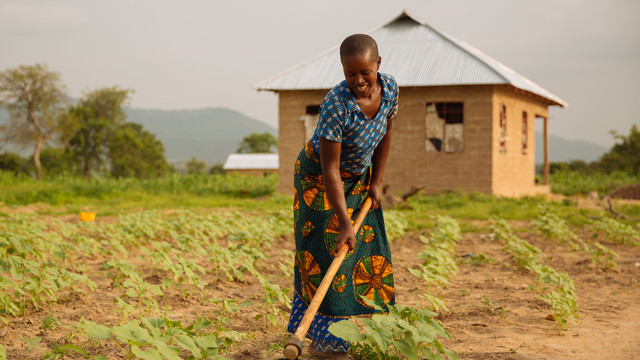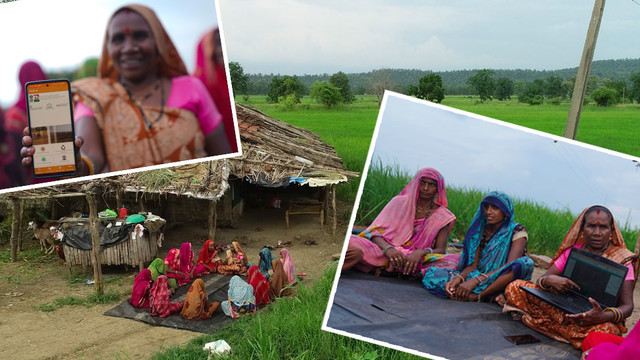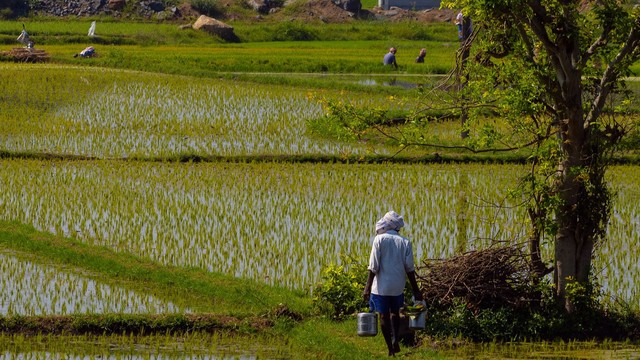
An octopus fishing vessel in Fuzeta Algarve south of Portugal (Photo: Cristina Pita, IIED)
The common octopus is an essential fishing resource for small-scale inshore fishing fleets in southern Europe, particularly in Portugal, Spain, Italy and Greece. But despite the increasing importance of octopus fisheries in the region, few countries have detailed data on their socioeconomic significance and management.
In early 2021, a leading intergovernmental research body picked up on a paper co-authored by IIED highlighting the importance of the common octopus.
A vital resource for small-scale fishers
Small-scale fisheries are an essential source of employment, income and food for millions of people around the world. The common octopus (Octopus Vulgaris) is the most important commercially harvested octopus species in the European Union (EU). This species is fished at depths between 20-200 metres in both the northeast Atlantic and the Mediterranean Sea, mainly by small-scale coastal fleets but also by trawlers, especially in deeper waters.
Inshore, local, small-scale fishing fleets have an important role in the economic and social fabric of coastal fishing communities. The common octopus is a vital resource in Portugal, Spain, Italy and Greece, which together account for over 90% of both the quantity and value of octopus landed in the EU.
But despite the increasing importance of octopus fisheries in southern Europe, few countries have collected detailed data on their socioeconomic value and management. The value of common octopus fisheries is likely higher than can be estimated by looking at official landings, partly because these are not well-documented and are often under-reported. There is also no formal stock assessment for octopus.
Regulation is complex too. The EU's Common Fisheries Policy sets rules for managing member states' fishing fleets and conserving fish stocks. Designed to manage a common resource, it gives all EU fishing fleets equal access to EU waters and fishing grounds and allows fishers to compete fairly. But the policy quota regulations do not include octopuses, and different EU member states use different input and output control measures in managing their fisheries.

A box of octopus for sale in the fish auction in Vigo, Galicia, Spain (Photo: Cristina Pita, IIED)
What was our contribution?
IIED and academics from Spain, Portugal, Italy and Greece came together to assess common octopus fisheries. They co-authored a paper describing and comparing the current status of small-scale common octopus fisheries across the four countries, their socioeconomic importance, current management arrangements, and opportunities and challenges for the future.
Our findings suggested:
- The future of the octopus fishery in the south of Europe depends on the successful implementation of management measures to fight illegal fishing, improving control and enforcement of rules and regulations, and (in some places) increasing the minimum landing sizes for the common octopus
- Increased community participation and co-management could be beneficial for management
- Bio-socioeconomic studies of local common octopus small-scale fisheries are important in order to examine the implications of (alternative) management strategies, and
- The future economic viability of the octopus fishery is highly dependent on improving sustainability and markets for octopus.
In early 2021, the scientific journal Fisheries Research published the paper, 'Fisheries for common octopus in Europe: socioeconomic importance and management'.
The work was picked up by the International Council for the Exploration of the Seas (ICES). ICES is an intergovernmental marine science organisation that provides evidence on the sustainable use of our seas and ocean. It has a network of nearly 6,000 scientists from more than 700 marine institutes in 20 member countries and beyond.

ICES’ Advisory Committee translates ICES science into advice on sustainable marine ecosystem use and protection, advising ICES member countries, international commissions and organisations, and fisheries and ecosystem management bodies. This includes being an advisory body for the European Commission (EC) and EU member states on annual fisheries quotas.
In January 2021, ICES published an article featuring the paper, drawing attention to the issues explored – the management and socio-economic importance of the common octopus in Europe – and the paper itself.
A review of the paper was also published on a specialised site for fisheries sector stakeholders alongside an ICES statement saying it aims to fill knowledge gaps on cephalopods (octopus, squid and cuttlefish) and that the members of its Working Group on Cephalopods Fisheries and Life History (WGCEPHS) would aim to fill critical knowledge gaps, including collecting more data on cephalopod ecology and fisheries.
In addition, both as a result of this paper and the long work on octopus fisheries in Europe carried out by IIED’s principal researcher Cristina Pita, IIED has been invited to advise a project called ParticiPESCA, which is being developed by WWF-Portugal, the Environmental Defense Fund (EDF), Oceano Azul Foundation, the Centre of Marine Sciences (CCMAR-Algarve) and the Portuguese Institute for Sea and Atmosphere (IPMA) to advance co-management of the small-scale octopus fisheries in the Algarve, in southern Portugal.
IIED continues to work with researchers, fishers and other actors in the value chain to map the common octopus value chain globally. Pita co-leads the Global Octopus Network in the Small-Scale Fisheries Resource and Collaboration Hub (SSF Hub), a multilingual online platform for small-scale fishers, fish workers, and their communities and allies.
We are engaging with researchers and NGOs involved in octopus fisheries in Mexico’s Yucatán Peninsula to continue international work on these fisheries, which are increasingly important globally, and an essential source of revenue for small-scale artisanal fishers.
ICES is increasingly interested in the human dimension of fisheries – in their social and economic dimensions. The paper co-authored by IIED provided information that has helped to increase knowledge and stimulate further research on these topics.



